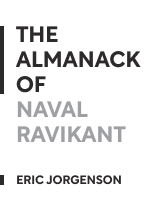

This article is an excerpt from the Shortform book guide to "The Almanack of Naval Ravikant" by Eric Jorgenson. Shortform has the world's best summaries and analyses of books you should be reading.
Like this article? Sign up for a free trial here .
What’s The Almanack of Naval Ravikant about? What are some of the book’s quotes that give insight into the overall message?
Many everyday people strive for wealth and happiness, but most of us struggle along the way and very few seem to achieve both. Still fewer share their insights about how to get there. Entrepreneur and self-made millionaire Naval Ravikant has become known for doing this online, via Twitter, podcasts, interviews, and blog posts. The Almanack of Naval Ravikant is a collection of those insights on wealth and happiness compiled by business blogger Eric Jorgenson.
We’ve pulled together several The Almanack of Naval Ravikant quotes to give you a good idea of what you can find in the book.
The Almanack of Naval Ravikant Quotes
Here are five of our favorite The Almanack of Naval Ravikant quotes, along with some explanation and context.
“A happy person isn’t someone who’s happy all the time. It’s someone who effortlessly interprets events in such a way that they don’t lose their innate peace.”
True happiness, as Ravikant understands it, comes from being at peace—another way to express this is: True happiness is fulfillment. When you have this happiness, you don’t long for anything more, and you feel your life is complete.
The first thing you have to do is simply decide to be happy. You can’t wait for external circumstances to become what you want or seek to change them—you need to be OK with them as they are. This isn’t easy to do, but Ravikant believes that by cultivating the right habits you can make it easier.
“Tension is who you think you should be. Relaxation is who you are.” (Buddhist saying)
If we’re going to be happy, we have to accept ourselves for who we are, says Ravikant. Many of us want to change who we are—we’d like to be someone else, or we feel disappointed that we’re not living up to the expectations people have for us. This frame of mind will always stand in the way of being satisfied and finding real happiness.
“Specific knowledge is found much more by pursuing your innate talents, your genuine curiosity, and your passion. It’s not by going to school for whatever is the hottest job; it’s not by going into whatever field investors say is the hottest.”
Ravikant believes that, to create products or attract money, you have to specialize in something. Specifically, you should develop a deep understanding of something technical or creative. Expertise in these areas is especially useful for developing products. You could, for instance, become skilled at coding and program an important piece of software that proves valuable to society. Software, once programmed, is infinitely reproducible and so has the potential to provide significant financial returns.
“Memory and identity are burdens from the past preventing us from living freely in the present.”
You’ll only find contentment by embracing your experience as it is right now—don’t look for things to be different than they are. Ravikant says that thinking about the past is the source of a lot of unhappiness. Maybe you regret something you did, or you wish things could be like they used to be. Similarly, looking to the future is often motivated by desire (for a change in circumstances, for instance). For Ravikant, to desire anything is to be discontent. This is unhappiness. According to Ravikant, all you really have is the present. Embracing it is key to finding contentment and true happiness.
“You’re going to die one day, and none of this is going to matter. So enjoy yourself. Do something positive. Project some love. Make someone happy. Laugh a little bit. Appreciate the moment. And do your work.”
According to Ravikant, the best way to accept yourself as you are is to simply accept your mortality: Life is short. Even the greatest cultures of the ancient world passed away, their accomplishments all but forgotten. When you recognize the brevity and insignificance of all things, you’ll be less inclined to obsess over who you are. With this perspective, you’ll realize that there’s little use in wasting your short life being frustrated or disappointed with yourself—you might as well enjoy the little time you have.

———End of Preview———
Like what you just read? Read the rest of the world's best book summary and analysis of Eric Jorgenson's "The Almanack of Naval Ravikant" at Shortform .
Here's what you'll find in our full The Almanack of Naval Ravikant summary :
- Millionaire Naval Ravikant's advice on how to build wealth and happiness
- The three types of leverage you'll need to become successful
- The habits to adopt that will lead to happiness






